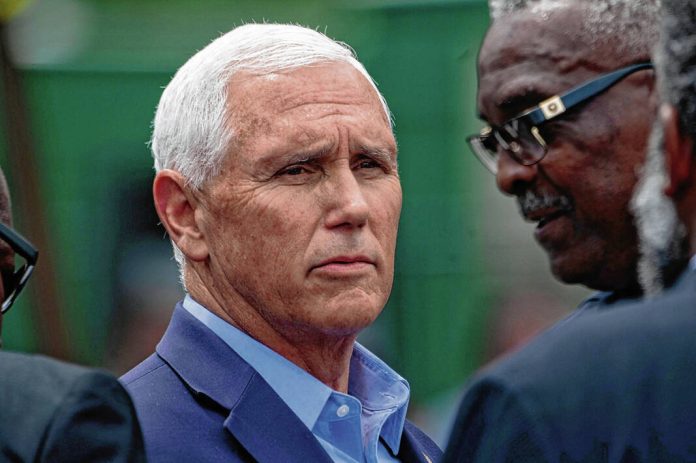
Republican presidential candidate former Vice President Mike Pence leaves the National Celebrate Life rally after speaking at the Lincoln Memorial on Saturday, June 24, 2023, in Washington. (AP Photo/Kevin Wolf)
Campaign finance filings suggest that former Vice President Mike Pence needs to dramatically pick up the pace at which he is attracting new donors to his 2024 White House bid to qualify for the GOP’s first presidential debate next month.
The debate, which will be held Aug. 23 in Milwaukee, is seen as the first chance for candidates to face their rivals in front of a primetime television audience. Though Pence, 64, a Columbus native, is a former vice president and longtime congressman, there is a real chance that he might be excluded from the primetime event even as he becomes the first vice president in modern history to take on his former running mate.
To qualify for the GOP presidential debate, candidates must earn 1% in three national polls or 1% in two national polls and 1% in one poll from one of the first four states holding a GOP primary and have 40,000 unique donors, including at least 200 unique donors in at least 20 states.
The requirements were set by the Republican National Committee, which said last month when it announced the criteria that it is “committed to putting on a fair, neutral and transparent primary process.” The RNC’s deadline for candidates to meet those criteria is Aug. 21, just over three weeks away, according to the RNC’s website.
As of this past week, Pence was polling in a distant fourth place for the GOP nomination, with 4.6% of voters saying they would support him, according to data-driven news site FiveThirtyEight, which compiles averages from several different national polls.
That means that the 1977 graduate of Columbus North High School should have no problem meeting the RNC’s polling criteria to participate in the debate.
But if recent campaign finance filings are any indication, Pence may not meet the RNC’s donor criteria and therefore would not qualify for a spot on the debate stage.
Filings with the Federal Election Commission show that Pence received contributions from 455 unique donors during the first 25 days of his campaign.
The filings, which are current as of the end of June, showed that the former vice president was on pace at the time to have around 1,492 unique donors by the RNC’s Aug. 21 deadline, well short of the 40,000 minimum.
In addtion, at least as of the end of June, Pence had not met the 200-donor threshold in any state, not even in his home state of Indiana, according to FEC records.
Pence’s campaign finance filings show that his campaign had received contributions from 134 unique donors in Indiana as of the end of June, more than any other state, followed by Virginia, where Pence had received contributions from 39 unique donors.
To reach 40,000 unique donors by the deadline, Pence would need to attract about 694 new unique donors per day from July 1 to Aug. 21 — roughly 38.5 times more than the 18 new unique donors per day that he averaged during the first 25 days of his campaign.
Though it is certainly possible that the pace at which Pence’s campaign is attracting new donors could have significantly jumped since the end of June, his campaign has yet to announce that he has crossed the thresholds even while some candidates who are polling lower than him nationally are already touting that they have met the requirements.
As of this past Sunday, six Republican presidential candidates have said that they are meeting all the requirements to participate in the debate, including former President Donald Trump, Florida Gov. Ron DeSantis, South Carolina Sen. Tim Scott, former South Carolina Gov. Nikki Haley, former New Jersey Gov. Chris Christie and tech entrepreneur Vivek Ramaswamy.
Scott, Haley and Christie are all polling lower than Pence, according to FiveThirtyEight. Christie and Pence formally launched their campaigns on the same day.
Pence expressed confidence this past week that he will meet all the requirements to participate in the debate before the deadline, telling CNN’s Dana Bash that “we’ll make it, I’ll see you at that debate stage.” However, he avoided quantifying how close he was to meeting the RNC’s donor criteria.
“We make the polling requirement very easily,” Pence told Bash last week on CNN’s State of Union. “…But, yeah, having 40,000 individual donors, we’re literally working around the clock. Got about a month to go. I’m confident that we’ll be there.”
When asked again by Bash how close he was to meeting the donor requirements, Pence said, “We’re making incredible progress toward that goal. We’re not there yet.”
Experts say that meeting the donor criteria for the debate is a likely indication of whether Pence and other presidential hopefuls are serious candidates for the GOP nomination.
While debates can help a candidate boost their campaign, the impact of the primetime events are generally greater when voters learn new information about a candidate, which is unlikely in the case of Pence, who is a “known commodity” with a long career in politics, said Marjorie Hershey, a professor emeritus of political science at Indiana University.
“What the party is trying to do in setting up these criteria is to make sure that it whittles the number of debaters down to serious candidates,” Hershey said. “…Debates can matter, typically only when they offer new information to people, and that’s not terribly likely in the case of Mike Pence. He has been vice president, he’s a known commodity. Actually being in the debate would probably only be a slight boost for him relative to being able to meet the qualifications and proving at this point that he is a serious candidate.”
Since launching his campaign in early June, Pence has struggled to find his footing, The Associated Press reported.
A lifelong conservative and staunch Trump loyalist while in office, Pence has been vilified by the GOP base for refusing to block the certification of Biden’s victory on Jan. 6, 2021, as Trump insisted, according to wire reports. The former vice president had no legal standing to block the election results despite Trump’s claims to the contrary, which sparked a violent uprising at the U.S. Capitol at which radicalized Trump supporters chanted for Pence to be hanged.
Trump continues to have a commanding lead in the polls, with 52.4% of voters saying they plan to back him as of Thursday, followed by DeSantis at 15.5% and Ramaswamy at 6.8%, jumping past Pence this past week, according to FiveThirtyEight.
In Columbus — where Pence was born and raised — the former vice president has not received much financial backing since formally launching his campaign, FEC filings show.
Pence’s campaign reported just two contributions for a total of $1,250 from Columbus residents as of the end of June. Of those contributions, $1,000 came from his brother Ed Pence.
Pence raised nearly $1.17 million during the 25 days he was officially in the race during the second quarter, including $346,740 in Indiana.
By comparison, Trump, the current frontrunner for the Republican nomination, reported raising $35.2 million over those same 25 days, including about $80,200 in Indiana.
Trump has raised $671.50 in the Bartholomew County area since Pence filed to run for president and a total of $2,118 during the current election cycle.
Only time will tell whether Pence will meet the criteria to enter the debate. In the meantime, Trump “stands astride the Republican Party like a colossus right now,” Hershey said.
“Mr. Pence has a serious problem in that his primary appeal is to evangelical Christians who vote Republican, and that’s a crowded lane,” Hershey said. “The great majority of those evangelicals prefer either Trump or DeSantis, and increasingly Trump. So, it’s hard to eke out enough support from a group of people who are pretty well committed to another candidate.”
“The big factor that is keeping Pence from getting support is simply Donald Trump,” Hershey added.




